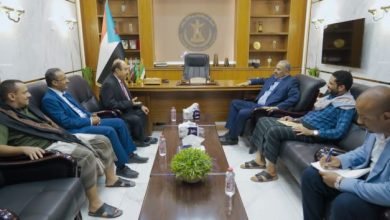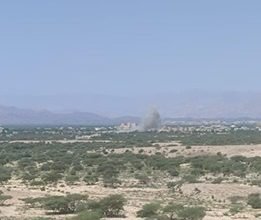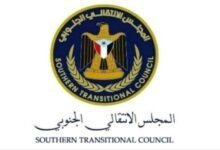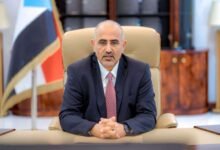National Southern Media Authority organizes press conference in Aden the capital
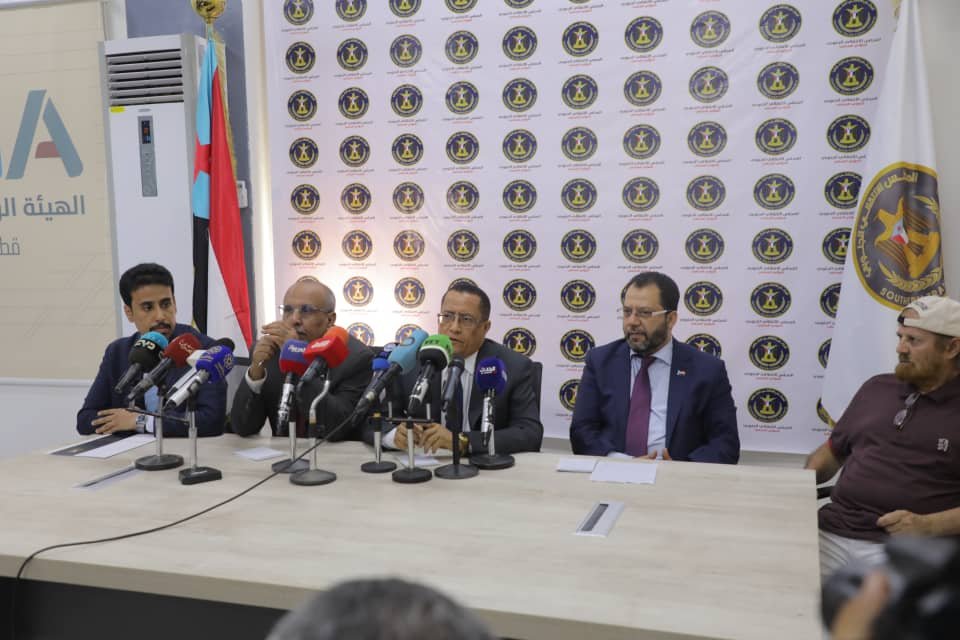
SMA NEWS – ADEN the Capital
The National Southern Media Authority organized, on Thursday, a press conference in the capital, Aden, in presence of a number of the members of the Presidency of the Southern Transitional Council.
At the conference, Dr. Nasser Al-Khubaji, member of the Presidency of the Southern Transitional Council, head of the Negotiations Affairs Unit, answered the questions of journalists and representatives of media outlets, which focused on the latest developments of the implementation of the Riyadh Agreement and the Council’s position on current events on various parts of the south, and the most recent of which was the terrorist attack on the training camp at Al-Anad base in Lahj governorate.
Dr. Al-Khubaji indicated that the other signatory party to the Riyadh Agreement is trying hard to disrupt its implementation by refusing the return of the government to accomplish its tasks entrusted to it, from the capital, Aden, stressing the importance of restructuring the Ministry of Defense and Interior and combating financial and administrative corruption.
Al-Khubaji pointed out that the Southern Transitional Council is closely monitoring all suspicious movements of terrorist groups, whether al-Qaeda, ISIS, the Brotherhood, and the Houthis, which united for one common goal, which is to strike security and stability and occupy the south.
Ali Al-Kathiri, member of the Presidency of the Transitional Council, official spokesman for the Council, and head of the National Southern Media Authority, started the press conference with a speech in which he welcomed the representatives of the media.
Eng. Adnan Al-Kaf, member of the Presidency of the Transitional Council, Chairman of the Higher Committee for Relief and Humanitarian Action, and the Undersecretary for Development Affairs of the capital, Aden, spoke about the services and the war being waged on the southern governorates in this aspect, blaming the Coordination Committee that manages the supply of power stations with fuel, responsible for the failure in managing this file.
Al-Kaf indicated that the governor of the capital, Aden, the Secretary-General of the General Secretariat of the Presidency of the Southern Transitional Council, Mr. Ahmed Hamid Lamlas, is making great efforts in solving the issue of electricity and other services in the capital, Aden, and that the Southern Transitional Council, despite all the challenges, obstacles and military war, is providing everything possible, according to what is available with it, to improve services in all governorates of the South.
During the press conference, Mr. Mohammad Al-Ghaithi, head of the General Directorate of Foreign Affairs, presented a political briefing, in which he indicated that the Southern Transitional Council did not come as a result of emergency circumstances, but rather as a result of long stages of the struggle of the people of the south, seeking to achieve their freedom and independence and achieve their legitimate aspirations, calling on for the need to actively and truly involve the south in the peace process led by the United Nations, taking into account the reality of the parties on the ground.
Al-Ghaithi stressed the importance of the presence of the Transitional Council as a representative of the cause of the people of the south in formulating and designing the framework and shape of the political process, and any attempts outside this context will be a repetition of the process of excluding the south.
In his briefing, Al-Ghaithi added: “The Riyadh Agreement emphasized that the South should be key partner in decision-making and determining the shape and future of the final solution in the South and Yemen. However, the existing obstacles that prevented the implementation of many of the terms of the agreement, and caused the absence and disruption of many of the provisions of the agreement caused disturbance of the State institutions and public services, without taking into account the extremely dangerous humanitarian and economic situation, and this will undoubtedly require a clear position for the Council, and the case of thinking about any future steps will remain based on the extent to which the obstructing parties respond and stop their practices.”
In his briefing, Al-Ghaithi indicated that the Southern Transitional Council explained its position to the President of the Security Council and the member states in an official letter, in which he also indicated that the other party has not fulfilled any of its obligations, and was not serious about the return of the government to the capital, Aden, stressing the renewal of the Council’s call for the return of the parity government, between the south and the north to the capital, Aden immediately, blaming the other party in the Riyadh Agreement for the responsibility of continuing to obstruct and refuse to return.
In turn, Dr. Mohammad Ali Matash, Chairman of the Supreme Economic Committee of the Southern Transitional Council, delivered a briefing entitled “The Past, Present and Future of Development in the South, the Available Opportunities and the Role of the Committee in Achieving its Goals.” In which he reviewed the destruction that affected the economy and infrastructure in the south during and after the occupation of the south in 1994 until the present time and what should be done to get out of the current economic situation and accelerate the process of economic growth and make it a sustainable economic development.
In his briefing, Dr. Matash pointed out that the Supreme Economic Committee’s role lies in adopting sound scientific planning in all fields and setting short and long-term economic plans as well as strategic plans, including an economic vision focusing on aspects of development in the fields of agriculture, fisheries, industry, strengthening infrastructure, and identifying sustainable financing methods to modernize and create appropriate infrastructure, support private sector investment, benefit from growth potential, and dry up and eliminate sources of corruption.
The press conference included other questions from journalists and media representatives and they were answered by the Council’s leaders, who provided a clear image of the current situation in the southern regions and the latest developments regarding the economic aspect and political developments that are related to the South.



